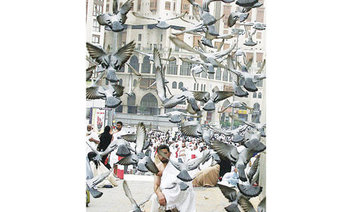MADINAH: During a tour of the bird market in Madinah, you see all kinds and shapes of pigeons from across the world.
Talaat Hamza Zakour, a pigeon breeder, told Arab News that the hobby of keeping birds has occupied him since his childhood.
“At first I did not know the types of pigeons but with the passage of time I got to know them, and that each one has a different advantage. The homing pigeon is considered the ‘best’ of its kind and the price of a single pigeon may reach more than SR100,000 ($26,666).”
He also said that homing pigeons “are rare in Madinah because no competitions are organized here. There is an association for pigeons in Madinah, but it is ineffective and no one goes to it.”
Zakour said: “Fancy pigeons come next. These birds are known by different names including the Kuwaiti, Butterfly, Mango, Turkish and Mookee pigeon and their price sometimes reaches SR2,000 each. The price of the Jacobin pigeon reaches up to SR6,000, the Sudanese pigeon is worth SR3,000, the Syrian pigeon SR800, English pigeon SR4,000 and the Pakistani pigeon is worth SR3,000.”
According to Zakour, there is a special Turkish breed that can fetch up to SR40,000, but the homing pigeons are considered the most expensive.
Zakour pointed out there is a kind of pigeon called “Al-Zaeem” meaning “the leader.” It is, he said, very popular among amateurs and is also priced at SR40,000.
“It is called the ‘leader’ because it leads the flock of pigeons and has a distinct color and shape,” he said, adding that pigeons need health care, attention and time.
Ahmed Nour, an owner of a pet shop, told Arab News that “the interest in pigeon breeding has diminished as a result of people’s preoccupation with other things, and modern technology has made many people refrain from keeping and caring for them.”
Prized pigeons are big attraction at Madinah market
Prized pigeons are big attraction at Madinah market














